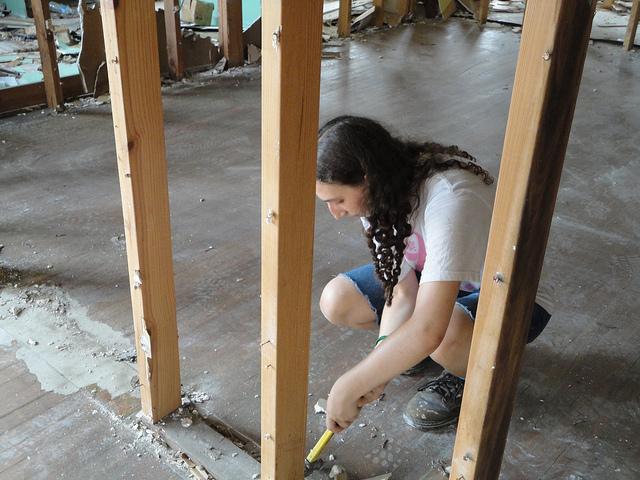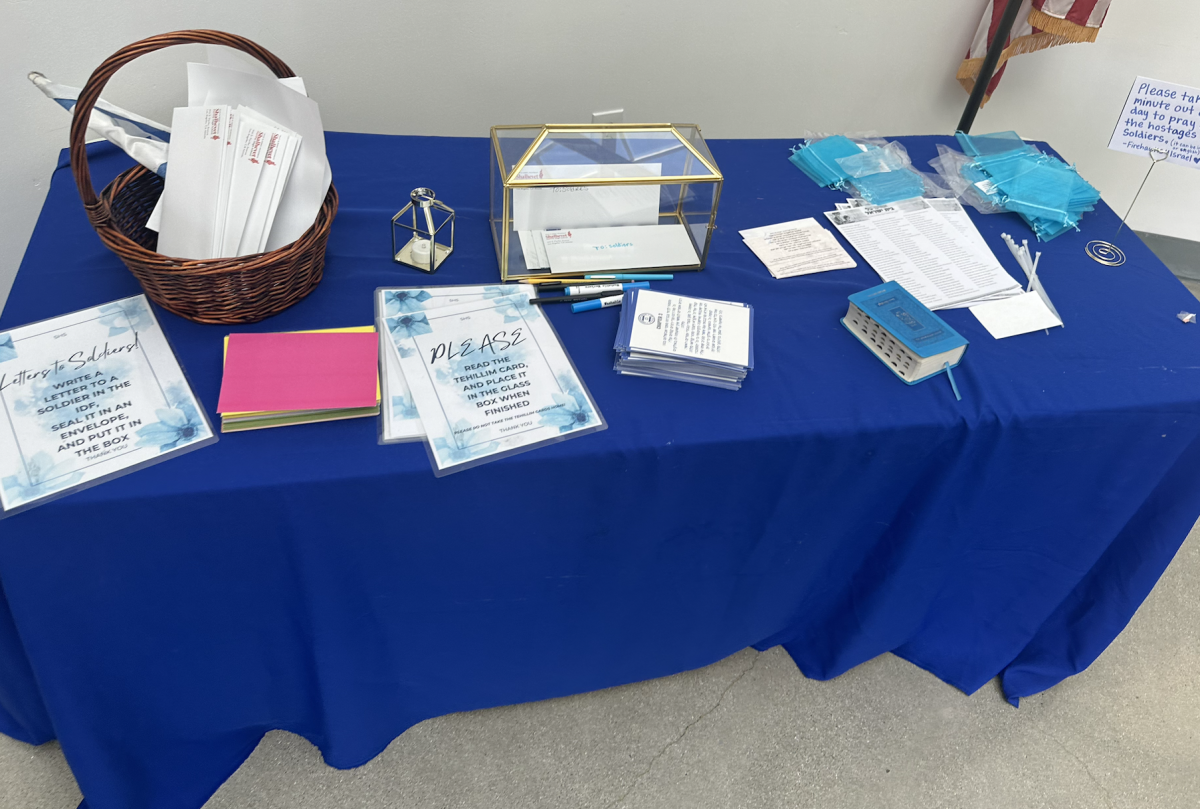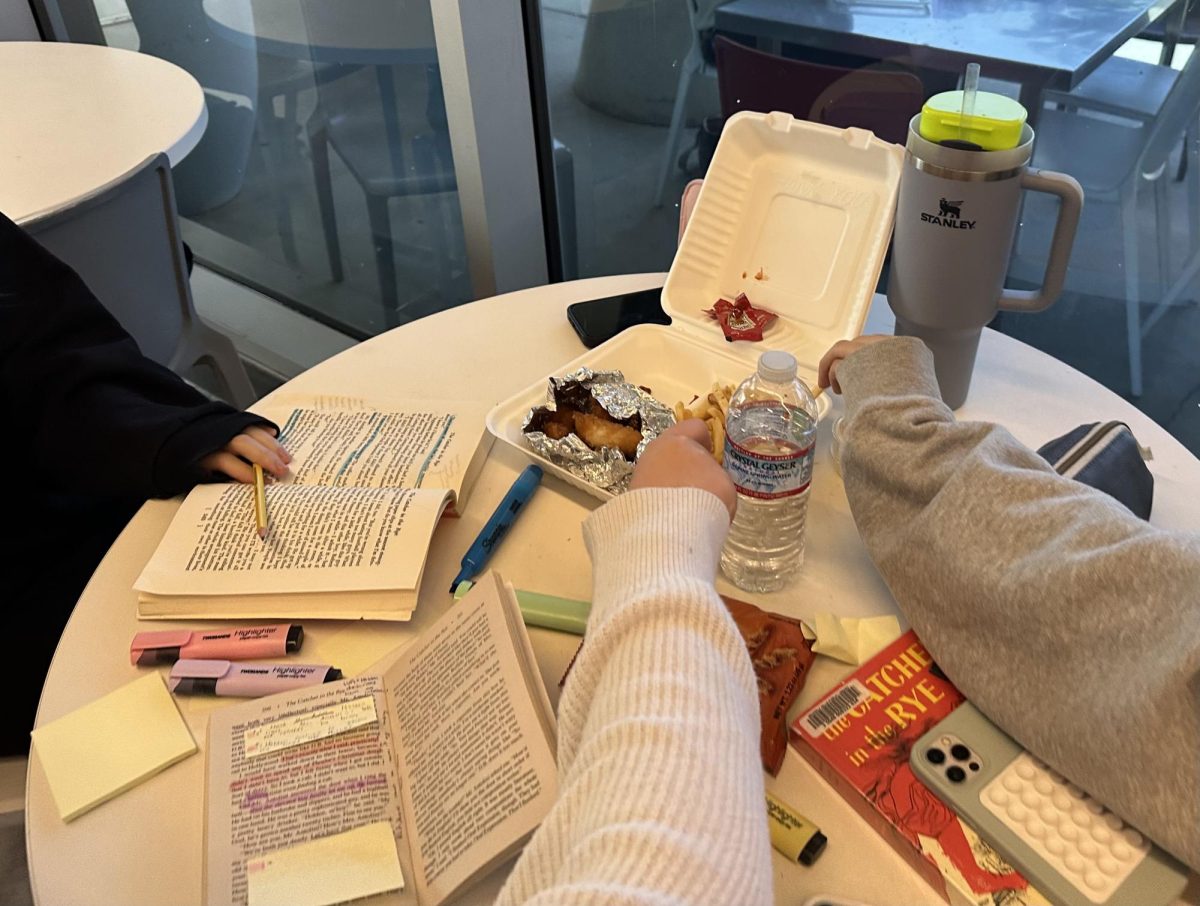… as teens learn how to help build homes by tearing them down
In your steel-toed boots you walk through the maze of an old, abandoned furniture store in search of the hammer crowbar you left on the floor. You take your tools and begin ripping down a wall, using multiple successive jerking movements. The wall comes off. Task completed. Your new mission is to carry the naily board, without letting the spikes hit any obstacles, to the de-nailing room where you must take the nails out of your board without snapping the wood. After that, congratulations! You now have materials for the bonus challenge of building shelves without as much as a drawing.
Though it may sound like a video game, this is the actual experience that 17 teenagers and four 20-something staffers from around the U.S. had this past summer vacation, as they unplugged themselves from the world of digital and verbal simulation and tore down and painted houses for Habitat for Humanity, which builds affordable residences for low-income families. Instead of going on a family vacation, working at or attending a summer camp, or taking summer courses, they volunteered to travel to Arkansas to volunteer their time doing physical labor.
Their trip was one of three sponsored by the American Jewish Society for Service (AJSS) during its 60th summer of service in the U.S. For six weeks they built shelves — to store their tools using the wood they salvaged — served food at the Salvation Army, and organized food banks, a domestic abuse shelter and Habitat for Humanity’s “Re-Store” where used construction materials and furniture are sold to pay for more projects.
Among the tasks involved were deconstructing a building, shingling a roof, weeding abandoned lots in New Orleans, and painting houses in the greater Little Rock area. It was a huge change from the desk-work that all 21 volunteers were used to.
“It was definitely hard at first because I hadn’t done anything like it at all, but towards the end it gets easier,” said Shani Weisberg, 17, of Long Island, New York. “And I got a lot of muscle out of it.”
Ilan Layman, 17, of Olney, Maryland, had spent his previous six summers at Camp Ramah in New England.
“I was really interested in helping a community that wasn’t mine for the summer and I wanted to change lives for the better,” Ilan said.
Working more than five hours six days a week from June 27 to August 6, the volunteers developed a new set of skills. They learned the most efficient way to de-nail a board — grasp the side sticking out with the back of a hammer and bend it to the side, unless it’s still attached to the building in which case one should grasp the nail and then bend it up or down.
They learned how to lift large, heavy objects —strong hand in front, hands facing out, elbows locked.
And they learned how to start a row of shingles on a roof: look for the correct tab in the row below, line the edge of the shingle with the hidden top tab and the bottom of the shingle with the top of the bottom tab in a perfectly straight line; nail thrice but never where the nail would become exposed.
“I felt really accomplished like every day, because from the first day on the ‘de-con’ site to the last, the progress we made for Habitat was enormous,” Ilan Lyman said.
“The work made me appreciate what a house was made of — what you live in for your whole life,” he added. “A house is more than wood put together. It protects you, and knowing how to build it makes you not take anything for granted any more.”
At first, the volunteers were disappointed to learn that they would be taking a building apart instead of putting one up, because it didn’t fit with their image of helping people. But gradually they learned that though something might not fit that image, it can be integral backstage work for the classic images of social service.
“We soon came to realize that we were doing deconstruction so that they could do construction,” Jackie said. “It has the meticulous parts too. You need to be careful not to break the wooden boards, because wood is valuable and Habitat needs it to sell to fund construction.”
Though deconstruction was the group’s main project, they also painted houses, built shelves, organized the “Re-Store,” loading and unloading trucks of donations and helping out on construction sites. The only time anyone was bored was when they were painting.
“Painting was annoying because you never knew what you had and hadn’t done because it was painting white on white,” said Molly Gimbel, 16, of Boonton Township, N.J.
And always, they learned and practiced new skills. Jackie Chipkin, 16, of Longmeadow, Mass., said the most meaningful work the group did was on its last day.
“On the first day we were really excited to be building houses, [but] we had to clean up this worksite and move shingles into a house to be transported because that is what they trusted us to do,” Jackie said.
“Then after six weeks when we all learned how to properly use a hammer and stuff, they took us to that same house and we were trusted to take those shingles and physically put a roof over a family’s head. We had to make the roof perfect so it wouldn’t leak and the house could stay dry.”
On a weekend trip to New Orleans, the group volunteered with a community center helping with the aftermath of Hurricane Katrina. Nobody would have expected it, but the greatest need for their labor was in weeding the years-old grass that grew in empty lots where homes had stood before the storm.
“The weeds were too thick and too tall for any machines to go through and it was kind of nice to realize that machines can’t do everything,” Jackie Chipkin said. “The only way those lots were going to get weeded is if a group of volunteers came out and weeded it by hand.”
For everyone on the AJSS trip to Little Rock, Shabbat was already a part of their lives as a day of rest. But after doing physical work all week long the concept of rest on the seventh day took on a new meaning.
“We all took Shabbat naps,” Jackie Chipkin said. “Working all week you get tired so Shabbat isn’t just a time to mentally rest but physically rest and catch up on sleep.”








Sustainable Dave • Sep 3, 2010 at 3:30 am
Jaclyn,
Fantastic article and how awesome was your summer? I’m guessing your life has changed, and for the better I’m sure. I was jealous reading what you accomplished and now will be looking into that program myself once I get settled. Kol Hachavod for taking the road less travelled!